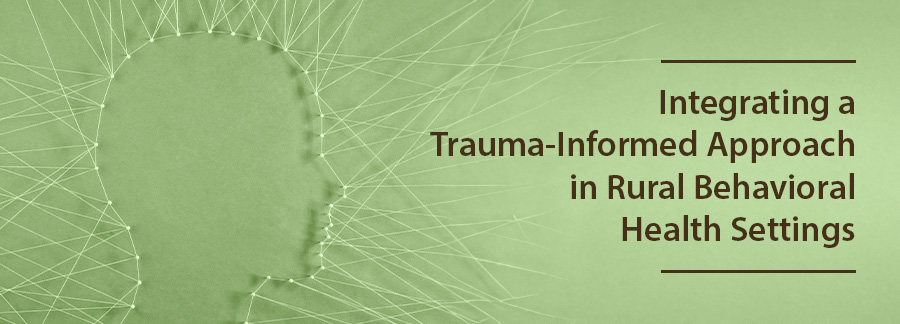

Integrating a Trauma-Informed Approach in Rural Behavioral Health Settings (TIA)
Over the past 20 years, a growing understanding of the pervasive and harmful impact of traumatic events on individuals, families and communities has led to the emergence of research on the effects of trauma and treatment strategies to address mental health. According to SAMSHA, trauma is a widespread, harmful, and costly public health problem, occurring as a result of violence, abuse, neglect, loss, disaster, war and other emotionally harmful experiences. While many people who experience a traumatic event do not have lasting negative effects, others experience more difficulty with traumatic stress reactions. Emerging research has documented the relationships among exposure to traumatic events, impaired neurodevelopmental and immune systems responses and subsequent health risk behaviors resulting in chronic physical or behavioral health disorders. Studies in criminal justice and child welfare systems reveal high rates of mental health. There are no boundaries when it comes to trauma regarding age, gender, socioeconomic status, race, ethnicity, geography, or sexual orientation.
This 7-week online learning series will increase the skill level of behavioral health professionals working in rural areas to define and recognize trauma in individuals. Rural practitioners who are able to help participants manage their symptoms using a strength-based approach minimize the re-traumatization and provide supports that are trauma informed.
WHEN:
Weekly sessions offered on the same day and start time between March 21 and May 2, 2024. Day and time will depend on your location. Please locate your local time zone in the table below for your weekly start time.
| Location | Start Date | End Date | Weekly Start Time |
| California/Nevada | Thurs, March 21 | Thurs, May 2 | 3:00 pm PDT |
| Arizona | Thurs, March 21 | Thurs, May 2 | 3:00 pm MST |
| Hawaii | Thurs, March 21 | Thurs, May 2 | 12:00 pm HST |
| Pago Pago, American Samoa | Thurs, March 21 | Thurs, May 2 | 11:00 am SST |
| Koror, Palau | Fri, March 22 | Fri, May 3 | 7:00 am PWT |
| Hagåtña, Guam | Fri, March 22 | Fri, May 3 | 8:00 am ChST |
| Saipan, CNMI | Fri, March 22 | Fri, May 3 | 8:00 am ChST |
| Palikir, FSM | Fri, March 22 | Fri, May 3 | 9:00 am PONT |
| Majuro, RMI | Fri, March 22 | Fri, May 3 | 10:00 am MHT |
OBJECTIVES:
- Describe the core components of trauma
- Identify initial and ongoing reactions to trauma
- Describe the effects of trauma on learning
- Outline the Polyvagal Theory to conceptualize trauma
- Identify the key principles of a trauma-informed approach for treating mental health disorders using DSM-5 criteria
- Review common experiences that produce traumatic impact and posttraumatic growth
- Review the relationship between childhood trauma and suicidal ideation
- Discuss treatment planning for trauma using strength-based approaches
INTENDED AUDIENCE:
Rural professionals in behavioral health, mental health, and medical practitioners located in the Pacific Southwest Region (HHS Region 9: Arizona, California, Hawaii, Nevada, and the Pacific Jurisdictions).
PARTICIPANT COMMITMENT & EXPECTATIONS:
- Attend a live 1-hour Orientation Session on Thursday, March 21 at 3:00 pm Pacific (refer to chart for accurate scheduled dates/times in your time zone).
- Commit to 6-weeks of training for 1.5 hours weekly on scheduled series days/times and complete 1-hour of weekly learning activities
- Access to appropriate technology to utilize online videoconferencing platform (i.e., an internet connection, built-in or USB webcam, computer/tablet, built-in/USB/Bluetooth speakers and microphone)
- Be prepared and actively engage while on camera during the scheduled series time
FACILITATOR:
- Kate Speck, PhD, MAC, LADC
THERE IS NO COST TO PARTICIPATE
Registration for this series is limited to 35 providers who work in Region 9 on a first come first served basis (Arizona, California, Hawaii, Nevada, and the Pacific Jurisdictions). Once the 35 spots have been filled, registration will be closed. Due to limited enrollment, if you cannot commit to the full requirements, please defer this opportunity to others.
Note: Registrants enrolled in this series are required to attend the orientation and first content sessions. If you cannot attend these sessions, you will forfeit your attendance. In addition, it is expected that participants will have access to the appropriate technology by Week 1 to be able fully participate and be on camera during the session. This is not a webinar series and active participation is required to gain/improve skills.
CONTINUING EDUCATION:
The series has been approved for a total of 16 contact hours (15-hours content instruction and 1-hour orientation session). No credit will be awarded for non-attendance or partial attendance. The knowledge and skills learned should be applied within the framework of any applicable Operating and/or Credentialing regulations in your State of practice.
QUESTIONS:
Please contact psrotar@casat.org or by phone at 833-869-4353 with questions about this series
ACCESSIBILITY:
If any accommodations are needed, please contact us at psrotar@casat.org or by phone at 833-869-4353. Requests should be made as soon as possible and preferably at least two weeks prior to the start of the series.


